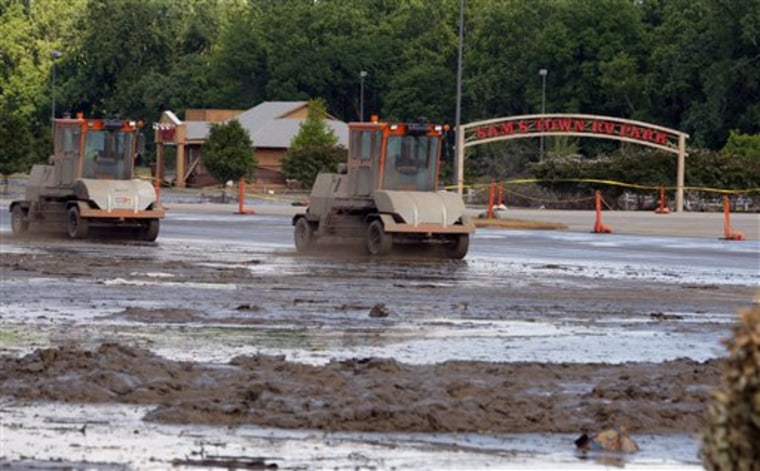The aftermath of a disaster like the floods that submerged parts of Mississippi or the tornadoes that have wiped out towns in the Midwest and Southeast can leave victims with depression and other ailments. Although the wait was agonizing as floodwaters rose, experts say the extra time makes a difference in the long run.
The Mississippi River flooding has been a slow-motion disaster as the water made a monthlong trek from the Midwest to the Deep South. Most had plenty of warning that their homes could wind up under water. That hasn't made it any easier for folks impatiently waiting to get back and look at the damage.
"I'm about to go nuts," said Charlie Barringer, 71, from an apartment 26 miles from his home in Tunica's Cutoff community. "I'm an outdoorsman. Sitting in a room looking out the damn window across a field, that ain't my life."
Experts said they didn't know of any work done to study the mental health implications based on how long people know a disaster is coming, though there are bodies of work on the impact that follows.
About one-third of the people who endure disasters on the scale of the river flooding or the tornadoes can suffer anxiety, depression or other mental ailments for up to a year or two, said David Abramson, director of research at the Columbia center. Ailments lasting longer are rare, he said.
The Mississippi flooding began May 2, when officials blew up part of a levee in Missouri to protect a town in Illinois. As high water rolled downriver to the Deep South, they were diverted through floodgates into the Atchafalaya Basin, prompting hundreds to evacuate. On Monday, the river's crest is expected to reach Morgan City, La., where the flood waters empty into the Gulf of Mexico.
The extra lead time many victims in that area have had could reduce stress in the end, said Irwin Redlener, director of Columbia University's National Center for Disaster Preparedness.
If you can get yourself and your family out safely with important papers and even emotionally important keepsakes, "you can restart your life," he said.
And, because injury and bereavement are major causes of psychological distress, warnings "are indirectly probably our greatest mental health intervention" by getting people out of harm's way, said Fran Norris, director and principal investigator of the National Center for Disaster Mental Health Research.
Even the warning 24 minutes before the tornado hit in Joplin, Mo., killing 132, was substantial, Abramson said.
"In Israel, the warning systems for incoming missile attacks are 15 seconds," he said.
The problem, typically, is getting people to pay attention to warnings.
"It's kind of the opposite of the popular myth that if you warn people of disaster they'll panic," said Dennis Mileti, professor emeritus at the University of Colorado's Natural Hazards Center in Boulder. "The problem is the opposite — getting them off the couch."
Photographs and video of earlier spring floods probably made it easier to convince people farther downriver to protect their property and leave, he said. The psychologically taxing piece as people return from the disaster will be coping with all the questions: Where will we live? Where will the children go to school?
Diane Austin, 47, and her parents, aunt and uncle all got safely away from their homes in the Cutoff community, but they haven't been able to go back and survey the damage.
"I'm concerned about what I'll find. I'm more concerned about if they'll let us back," Austin said.
It may not be until sometime this week, and those who have to rebuild will have to meet new FEMA regulations, said Larry Liddell, spokesman for the Tunica County Emergency Management Agency.
And "with all the rules and regulations, you have to be a millionaire to get everything back up to code," Austin said.
Over in Tuscaloosa, Ala., Flora and Michael Thomas' home was devastated by the twister that hit April 27. They are unable to get FEMA money for temporary housing and are living in a house without electricity and missing part of its roof. A blanket covers a living room window blown out by flying debris.
The days keep getting hotter, and Thomas said her family's situation isn't getting any better. Insurance papers spread out in front of her on an ottoman in a dark den, she wrung her hands, fretting about the dusty air, probably including asbestos from ripped-up shingles. The worry is overwhelming, as Flora Thomas wonders when the insurance claim will be paid, when construction crews can fix her home, when life can get
"It can't be good for you breathing all this stuff," she said Tuesday, worry in her voice. "My voice is deeper, my throat is scratchy."
Life is just stressful these days, said Thomas. Who knows when the insurance company will pay their claim; when a construction crew will begin fixing their home; when life will get back to normal?
"I don't want to be here, but we don't have a choice," said Thomas.
___
Janet McConnaughey reported from New Orleans. Shelia Byrd reported from Tunica, Miss. Associated Press writer Jay Reeves in Tuscaloosa, Ala., contributed to this report.
